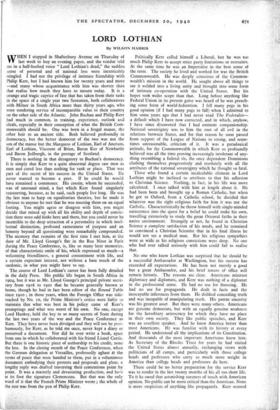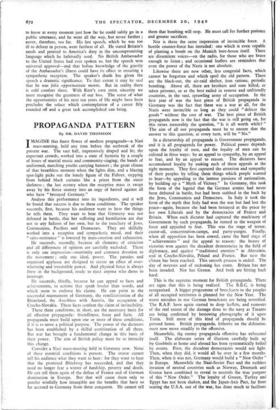LORD LOTHIAN
By WILSON HARRIS
WHEN I stopped in Shaftesbury Avenue on Thursday of last week to buy an evening paper, and the vendor told me in a half-hushed voice " Lord Lothian's dead," the sudden sense of personal and of national loss were inextricably mingled. I had not the privilege of intimate friendship with Philip Kerr, but I had known him for twenty years and more —and many whose acquaintance with him was shorter than that realise how much they have to mourn today. It is a strange and tragic caprice of fate that has taken from their tasks in the space of a single year two Scotsmen, both collaborators with Milner in South Africa more than thirty years ago, who were rendering service of incomparable value to their country on the other side of the Atlantic. John Buchan and Philip Kerr had much in common, in training, experience, outlook and ideals, especially in their conception of what the British Com- monwealth should be. One was born in a frugal manse, the other heir to an ancient title. Both believed profoundly in democracy, but the better democrat of the two was not the son of the manse but the Marquess of Lothian, Earl of Ancrum, Earl of Lothian, Viscount of Brien, Baron Ker of Newbattle and Baron Jedburgh, in the peerage of Scotland.
There is nothing in that derogatory to Buchan's democracy. It is simply that Kerr to a quite abnormal degree saw men as men and cared less than nothing for rank or place. That was part of the secret of his success in the United States. He never wanted to become a peer. If he could he would have remained a commoner. His cousin, whom he succeeded, was of unsound mind, a fact which Kerr found singularly reassurring, because, as he said, such people live long. He was the last man to harp on equalitarian theories, but he made it obvious to anyone he met that he was meeting them on an equal footing. You might agree or disagree with him, you might decide that mixed up with all his ability and depth of convic- tion there were odd kinks here and there, but you could never be insensible to the deep attraction of a personality in which intel- lectual distinction, profound eamesmess of purpose and an honesty beyond all questioning were remarkably, compounded. The memory that remains of the first time I met him, at the door of Mr. Lloyd George's flat in the Rue Nitot in Paris during the Peace Conference, is, like so many later memories, of that characteristic smile of his, which expressed so much—a welcoming friendliness, a general contentment with life, and a certain expectant interest, not without a bare touch of the sardonic, in what you might have to say.
The course of Lord Lothian's career has been fully detailed in the daily Press. His public life began in South Africa in 1904, but it was as Mr. Lloyd George's principal private secre- tary from 1916 to 1921 that he became generally known at home, though he had in fact been editor of the Round Table since 1910 ; in those years, when the Foreign Office was side- tracked by No. to, the Prime Minister's critics were liable to maintain that what was best in his policy came of Kerr's promptings and what was worst of his own. No one, except Lord Hankey, held the key to so many secrets of State during the last two years of the war and the Peace Conference as Kerr. They have never been divulged and they will not be post- humously, for Kerr, as he told me once, never kept a diary or preserved a document. Nor did he ever write a book, apart from one in which he collaborated with his friend Lionel Curtis. But there is one historic piece of authorship to his credit, none the less. In the closing month of the Peace Conference, when the German delegation at Versailles, professedly aghast dt the terms of peace that were handed to them, put in a voluminous document embodying their protests and proposals and pleas, a lengthy reply was drafted traversing their contentions point by point. It was a masterly and devastating production, and bore at its foot the signature Clemenceau. But that was the only word of it that the French Prime Minister wrote ; the whole of the rest was from the pen of Philip Kerr. Politically Kerr called himself a Liberal, but he was too much Philip Kerr to accept strict party limitations or restraints.
At the same time he was an Imperialist in the best sense of the term. The society he lived and worked for was the British Commonwealth. He was deeply conscious of the Common- wealth's mission in the world. He sought above all things to see it welded into a living unity and brought into some form of intimate co-operation with the United States. But his hopes took wider scope than that. Long before anything like Federal Union in its present guise was heard of he was preach- ing some form of world-federation. I fell many pegs in his good opinion (if I had many pegs to fall) when I admitted to him some years ago that I had never read The Federalist— a default which I have now corrected, and in which, anyhow, I have since discovered that I had eminent companionship. National sovereignty was to him the root of all evil in the relations between States, and for that reason he soon passed from support of the League of Nations to strong, and some- times unreasonable, criticism of it. It was a paradoxical attitude, for the Commonwealth in which Kerr so profoundly believed was all the time proving increasingly intolerant of any- thing resembling a federal tie, the once dependent Dominions clothing themselves progressively and resolutely with all the attributes of the national sovereignty which he thought so fatal.
Those who found a certain incalculable element in Lord Lothian might be inclined to attribute to that his adhesion to Christian Science. Nothing, in fact, in his life was more calculated. I once talked with him at length about it. He had been born and brought up a Roman Catholic, but when he got to Oxford, from a Catholic school, he decided that whatever was the right religious faith for him it was not the Catholic. Characteristically he threw himself with single-minded earnestness into the quest for a belief he could make his own, travelling extensively to study the great Oriental faiths in their native environment. Strangely or not, he found in Christian Science a complete satisfaction of his needs, and he remained so convinced a Christian Scientist that in his final illness he would not see a medical man. But his religious sympathies were as wide as his religious convictions were deep.. No one who had ever talked seriously with him could fail to realise that.
No one who knew Lothian was surprised that he should be a successful Ambassador at Washington, but his success has exceeded all expectations. He has been not merely a good but a great Ambassador, and his brief tenure of office will remain historic. The reasons are clear. Americans mistrust diplomacy and diplomats, and Kerr was nothing of a diplomat in the professional sense. He had no use for finessing. He had no use for propaganda. He dealt in facts and the inescapable inferences from them. He disliked concealing truth and was incapable of manipulating truth. His patent sincerity was his greatest asset. But there were many others. Americans are genuine democrats, but with an equally genuine weakness for the hereditary aristocracy for which they have no place in their own society. They like public speeches, and Kerr was an excellent speaker. And he knew America better than most Americans. He was familiar with its history at every period. He understood all the implications of its Constitution. And thousands of the most important Americans knew him. As Secretary of the Rhodes Trust for years he had visited the United States almost annually, exchanging views with politicians of all camps, and particularly with those college heads and professors who carry so much more weight in America than college heads and professors do here.
There could be no better preparation for the service Kerr was to render in the last twenty months of his all too short life. To it he owed that astonishing sureness of touch with American opinion. No public can be more critical than the American. None is more suspicious of anything like propaganda. Kerr seemed to know at every moment just how far he could safely go in a public utterance, and he went all the way, but never farther ; never, therefore, too far. His last speech, which he was too ill to deliver in person, went farthest of all. He stated Britain's needs and pointed to America's duty in the uncompromising language which he habitually used. No British Ambassador to the United States had ever spoken so, but the speech won universal approval—and that before knowledge of the gravity of the Ambassador's illness could have its effect in ensuring a sympathetic reception. The speaker's death has given the speech a dramatic significance. To that extent it may be said that he was felix opportunitate mortis. But in reality there is cold comfort there. With Kerr's own stern sincerity we must recognise the greatness of our loss. The sense of what the opportunities of his next ten years of life might have been precludes the solace which contemplation of a career fitly rounded off and a great task accomplished can bring.



























 Previous page
Previous page